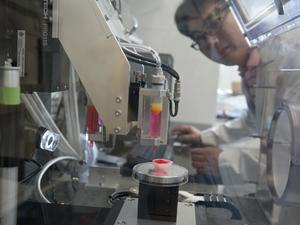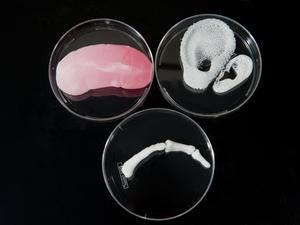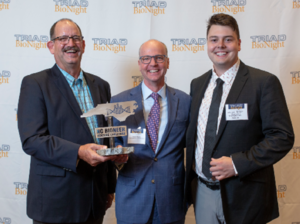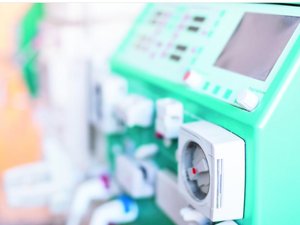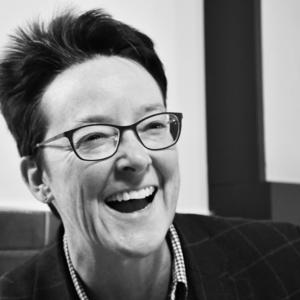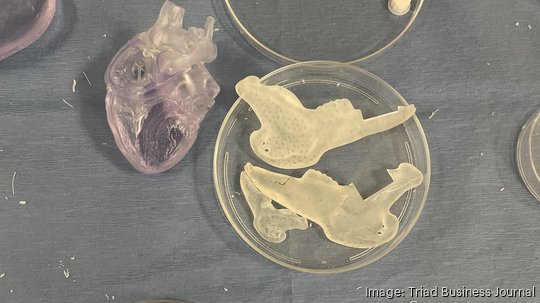
A Finnish 3D bioprinting startup is making Winston-Salem its home.
Brinter, from Turku, Finland, will make Winston-Salem its new headquarters as it looks to advance its 3D-printed, cartilage-based bioimplants towards commercialization.
“[We were looking for] a location to not only grow our science but also grow our company as an entity and an employer,” said Tom Alapaattikoski, CEO and co-founder of Brinter. “By far, Winston-Salem had more benefits for us as a startup and a growth company.”
A spinoff from Finnish industrial 3D printing company 3DTech Ltd., Brinter specializes in cartilage repair through personalized implants made by 3D bioprinters. Currently, the startup focuses on meniscus implants for knee surgeries.
While implants are nothing new in the medical community, Brinter does not use metal or plastic. Bioimplants use materials that the human body can dissolve, and Brinter goes a step further by using material that gets regenerated by the patient’s cells.
LEARN MORE: The science behind regenerative medicine
Founded in 2018 and going commercial in 2020, Brinter began by selling its printing technology to academic clients in Europe for research and development purposes, Alapaattikoski said. In 2021, the startup started selling in the United States and, just last year, pivoted its focus to developing bioimplant products.
Brinter currently employs 15 and plans to double its headcount within the next 6 to 12 months, with most of the roles being science-based.
Alapaattikoski has been based in Los Angeles, where he said there are other employees in marketing and sales. He is relocating to the Triad and, while Brinter will retain its employees in Los Angeles, Boston and Finland, all future hires are planned in Winston-Salem.
The company is already getting involved in the local startup and regenerative medicine ecosystems.
Last month, Brinter joined Winston Starts’ accelerator program.
The company also partnered with the Wake Forest Institute for Regenerative Medicine, a nationally recognized leader in the space, last November as part of WFIRM’s RegenMed Hub Innovation Accelerator.
Success with bioprinters leads to bioimplant product development
As it pivots its focus to bioimplants, Brinter will look to build on its success with its bioprinter technology.
It’s flagship bioprinter is called Brinter One, a multi-material deposition-based machine that works with both stiff and soft cell-laden hydrogels. In November 2021, it also launched Brinter Core, designed to make bioprinting accessible at half the size and cost.
According to media company 3D Printing Industry, Brinter has had clients in more than 10 countries.
Brinter signed a distribution agreement with California’s Laboratory Equipment Company (LEC) in November under which LEC will help sell Brinter’s products.
“We achieved clients from the East Coast to the West Coast, like UCLA, University of Michigan, Michigan State, Wake Forest, University of Minnesota,” Alapaattikoski said. “Once we found the right [biomaterials] from our academic connections, we started our bioimplant product development, which we are in the middle of.”
From the beginning, Brinter’s goal has been to create a regenerative-medicine-based bioimplant using its own bioprinters, Alapaattikoski told TBJ. He added that commercializing the 3D bioprinter for academic researchers helped Brinter validate its technology.
Raising at least $6 million in a “strong” biotech ecosystem
Alapaattikoski plans to slow down the commercial part of Brinter to focus on the product development of its bioimplants.
Brinter will begin three clinical trials next year, Alapaattikoski said, with a goal of human trials in 2025 and commercialization by 2028.
To date, Brinter has received $4 million in non-dilutive grant funding in Europe, according to Alapaattikoski.
In June 2021, Brinter raised €1.2 million in a seed funding round led by Innovestor, an early-stage firm based in Helsinki. Alapaattikoski told TBJ that the company also raised $800,000 in a Pre-A round in March this year.
Brinter is currently raising a Series A of $6 million to $9 million. Alapaattikoski hopes to close the round before the end of the year, hoping that the move to North Carolina, which is known for its biotech ecosystem, will prove fruitful.
“That’s one of the reasons we wanted to come to the North Carolina – it’s strong with biotech startups,” he said.
While Brinter is focusing on meniscuses, Alapaattikoski said that Brinter’s technology will have other applications – like in shoulder, hip, nose and ear implants.
“Eventually, 3D bioprinting and biomaterials will create replacement parts for all human parts, I believe,” Alapaattikoski said.
